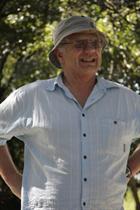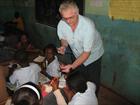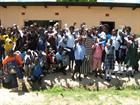Culdrose reservist on African adventure
Over the Easter period Chief Petty Officer Steve Houghton an air engineer from Royal Naval Air Station Culdrose spent three weeks in Southern Africa with the charity “Tearfund”, a Christian based Non Government Organisation (NGO), working with children and young adults in rural schools in Zambia.
Steve normally works on 824 NAS at the Air Station as a Civil Servant, but also in his spare time is a Royal Naval Reservist with 771 Search and Rescue Squadron were he teaches engineering to new joiners.
Steve takes up the story; “One of the aims of the Tearfund charity is improving the lives of children through creative learning. I was with a group of NGO workers helping out in schools near Kitwe, Zambia’s second city, deep in the Copperbelt region in North West Zambia, where mining is the major employer. It’s a large country, slightly bigger than Texas and known for the exploits of Dr David Livingstone the renowned Victorian explorer and Christian Missionary.
Some of the children were desperately poor and although they had very little they were enthusiastic and keen to learn. My background is with Physics and Aeronautical engineering from my career in the Royal Navy, so I decided to teach the children how to make paper planes and helicopters. Insisting they folded the paper along the straight edge, communicate and followed instructions precisely. Marking each one for its neatness and accuracy, teaching them the importance of being exact in their work and gaining a sense of achievement”.
Steve is no stranger to Africa and has also worked on projects in Kenya, Tanzania, Rwanda and Uganda as well as Thailand in Asia. But his latest adventure has brought him in to contact with some of the social and health issues which affect the region. Zambia has some of the highest levels of HIV in Africa; families are torn apart by poverty and orphaned by disease. Many schools are run by local communities and receive little government money.
Steve continues, “Attracting the children to learn and encourage them to make career choices is important in this part of Africa. They don’t necessary need another doctor or politician, but an engineer who can bring water and electricity to their village is more important.
On one occasion we went to teach at a school and found it shut, so we started the lesson on the school field. Hundreds of children turned up, more from a neighbouring village. Others were hanging over fences. So after some thought we turn the lesson into an Easter play and cards making with the children. In that situation you have to think on your feet. I’ve worked in classrooms in Cornwall and in the Royal Navy but these children are so happy and delighted to learn everything. Not many of them expected lessons in aeronautics or the joys of throwing a toy plane. I also didn’t expect to lose about four kilograms in sweat in the airless classrooms. They are super kids, willing to work with so little”.







